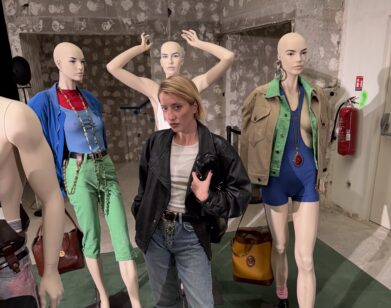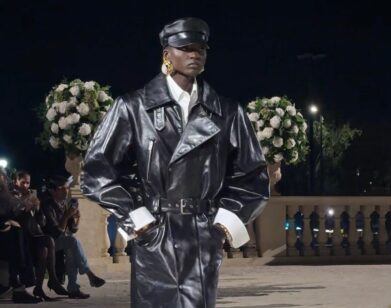Webs They Weave: David Shapiro x Emily Gould

ABOVE: DAVID SHAPIRO (LEFT) AND EMILY GOULD. PHOTOS BY DOM SMITH.
In both Friendship and You’re Not Much Use to Anyone, the debut novels written by Emily Gould and David Shapiro, respectively, characters deal with the effects of becoming, for whatever it’s worth, “Internet famous.” Amy, one of the two characters at the center of Gould’s novel, worked for a while at a gossip blog devoted to “mocking New York City’s rich, powerful, corrupt, ridiculous elite,” a job that “made her, momentarily, famous, or at least notorious.” Meanwhile, the protagonist of Shapiro’s novel garners a certain amount of notice when he starts a Tumblr, its posts written on a BlackBerry under a desk at his day job, which subjects the music site Pitchfork to the same obsessive scrutiny its writers apply to their reviews.
The stories will carry a certain echo for anyone familiar with Gould and Shapiro’s biographies. Gould was famously, or infamously, a no-holds-barred blogger in the early days of Gawker, a job that won her both admirers and critics. The shadow of Gould’s Gawker tenure has followed her since—as she released a memoir, took a publishing job, and founded an independent e-book subscription service—all the way into articles like this one, about the novel she’s releasing seven years later. Shapiro is the creator of Pitchfork Reviews Reviews, which functioned pretty much exactly as described in his novel and which he really did once mention to the President. (It also landed him journalism gigs at publications including this one.)
When they sat down to have a conversation for Interview, Shapiro was eager to acknowledge that his book is more or less completely autobiographical—with some details changed for expediency. Gould’s novel, she demurred, isn’t like that. The similarities between herself and Amy exist mostly on the surface level, and are secondary to the actual subject of the novel, the titular relationship between Amy and her best friend, Bev.
Still: Gould and Shapiro both live in Brooklyn; they’re both publishing novels this month about their particular youthful, well-educated, neurotic cohort; they have mutual friends; they are both intimately acquainted with the rewards, and perils, of blogging. They had plenty to talk about. —Alexandria Symonds
DAVID SHAPIRO: Do you like your book? No one ever addresses the possibility that a writer might not like her book.
EMILY GOULD: I feel guilty saying this, because so many other people really, really, really like my first book and have this strong personal relationship with it, where they feel like my first book, which is about me, is about them. I never want to say anything negative about it, because I feel like it would be insulting them.
SHAPIRO: So you don’t like the first one.
GOULD: It’s hard for me to read now. I don’t read from it, ever. There was a reading a few years ago where I knew that it would be the last time, and it was really great to have it definitely be the last time.
SHAPIRO: Okay. But this new book is not about you. People obviously think it is.
GOULD: No, it’s crazy the extent to which it’s not. But it seems like some sort of magic has happened, almost, where I foretold events that later came true, which makes it seem as though I wrote a book about things that had happened. But I didn’t.
SHAPIRO: If people said your book was chick-lit, what would you say?
GOULD: I would say, “Fuck you, pay me.” I would love it if my book was considered chick-lit or a beach read. That would be great. People would buy my book.
SHAPIRO: Oh. I was preparing for you to be offended.
GOULD: I think that genre distinctions basically boil down to marketing categories, which are outdated. Any time people have an argument about them, they’re arguing about something that doesn’t exist in any meaningful way that has to do with style or substance or actual content of books. What was behind the decision to consider your book fiction? Because this is the question that everyone asks you, right?
SHAPIRO: Actually, no.
GOULD: Really?
SHAPIRO: I haven’t been asked that question at all.
GOULD: But you didn’t invent characters or plots, did you? You just wanted the freedom to do that if you wanted to?
SHAPIRO: Yeah. I think once I decided I could call it fiction—
GOULD: It freed you to be more—
SHAPIRO: Yeah, to change stuff for time, to eliminate some boring parts. And there are also people who are identifiable as characters in the book, but there are words that come out of their mouth that they never said.
GOULD: Yeah, but that’s true of memoir.
SHAPIRO: I thought if it was memoir, you’d have to get it fact-checked or something.
GOULD: Nope. Memoir is what you remember.
SHAPIRO: But there are a lot of things that are changed and made neater than real life. A friend who is the basis for a character in the book said, “David, I didn’t sign up for this. I didn’t ask you to reflect my life in a way that might follow me around forever and is totally inaccurate.”
GOULD: But everyone’s going to perceive things that happened differently—so something might be 100 percent accurate as far as you perceived it, but not accurate in the way that someone else perceived it. Unless your aim is to deceive, there’s not a meaningful distinction between memoir and fiction. They’re marketing categories.
SHAPIRO: I wish my aim was to deceive, because then the whole endeavor would have been less embarrassing.
GOULD: Yeah, but I don’t think you’re actually capable of it. That’s what makes you a good writer and also probably—I’m extrapolating here because I don’t know you super well—a pretty challenging person to be friends with. Because you tell the truth.
SHAPIRO: Doesn’t everyone think of himself as a person who cuts through the bullshit and tells the truth? No human walking the earth thinks of himself as a bullshitter.
GOULD: Not a bullshitter necessarily, but women especially are trained to protect other people’s feelings, and a lot of that involves not telling the truth even about the fundamental details of your own experiences and your own life.
SHAPIRO: Yeah. I also want it to be fiction because the whole book is so embarrassing, and knowing that there a substantial number of parts in it that aren’t true made the whole thing feel less embarrassing.
GOULD: When you write in the third person, you get to imagine other people’s interiority, and at that point you have to do the work of making them characters, which I didn’t used to believe was a thing. When people talked about it, I thought it was total bullshit—the whole thing when authors are like, “My characters just came and they told me what they needed to do.” That actually, I found out, is a real thing, because you have to actually do this sort of deep empathic work of imagining how other people think and feel for it to work.
SHAPIRO: I haven’t gotten there. Wherever you are, I haven’t gotten there. In my book, there’s one character and then several human props.
GOULD: That makes it flawed as a novel, but brilliant as a memoir.
SHAPIRO: But I have no idea what people are talking about when I’m not in the room. How could you know possibly the contents of a conversation that you’re not part of? Are you listening through wire taps?
GOULD: You have to have the ability to empathize with someone else who is imaginary so strongly that you think and act and feel as that other person. Like Method acting. I think you’ll get there—nothing trains you better to write fiction than being really good at writing about your own interiority.
SHAPIRO: No, this is my last book. I’m retired. I swear to God.
GOULD: No, come on, Jay Z. You’re not retired. That’s bullshit. You can’t.
SHAPIRO: I don’t want to do this anymore. More than anything, I want to be done with this part of my life. I love being a lawyer more than I like writing.
GOULD: When I finished my first book, I wanted to be a yoga teacher, and I was, for a while. I didn’t write.
SHAPIRO: Yeah, but was being a yoga teacher engaging and stimulating for you?
GOULD: I wasn’t good at it. It was not the thing that I was best at. It’s very appealing to do the thing that you’re best at, no matter how much it wrecks your life.
SHAPIRO: You’ve read my book. Certainly this is not a bold statement: I’m better at being a lawyer than I am at being a writer.
GOULD: I’m sure you’re great at being a lawyer, but you can’t ignore how good you are at being a writer, and if you try, your brain and body will rebel until it makes it impossible for you to be a lawyer.
SHAPIRO: Why didn’t you blurb my book?
GOULD: [laughs] I didn’t want to offend our mutual friend. Also, Amazon. I also feel like you don’t need my help. I am pretty sure that you are going to succeed unless you find a way to sabotage yourself—cripple yourself on some kind of grand scale. Unless you do that, you are going to become a writer who everyone in your generation will read and care about forever.
SHAPIRO: That’s nice of you to say. I have no clue who would possibly buy and read this book besides my parents, who are not allowed to read it.
GOULD: This is a bullshit concern. I just want to tell you, though, interview or whatever aside, you owe it to yourself.
SHAPIRO: Why? I’m angry about this—people just assume that there’s something innately valid in pursuing a quote-“artistic” career.
GOULD: That’s not what I’m saying at all. I don’t think being a lawyer is more or less valuable than being a writer.
SHAPIRO: I don’t mean to raise my voice to you.
GOULD: [laughs] I’m not offended.
SHAPIRO: Are you going to have a baby?
GOULD: What baby are we talking about here?
SHAPIRO: I don’t know. Is that in your plan?
GOULD: This is going to sound incredibly fucked-up to say, but the idea that I have for my next book necessitates that I become a person who understands what it is like to have a baby.
SHAPIRO: So you’re going to have a baby to write a book. Not that, independently of writing the book, you shouldn’t have the baby. But is that part of your game plan?
GOULD: There’s a writer who I really love, Ludmila Petrushevskaya, who has told me that having children is part of the ride of being a human and being alive, and it’s a part of it that you shouldn’t skip. Do you think you will have a baby?
SHAPIRO: Of course.
GOULD: Who’s going to have your baby?
SHAPIRO: I don’t know, I’ll find someone. It’s just so central to your book.
GOULD: When I wrote the book, I was in a different part of my life—I’m still obsessed with money, who isn’t; but I was super focused on money because I didn’t have any. Like, none. Babies, to me, seemed like a huge status symbol—like there’s this bin that financially stable 35-year-olds in Brooklyn go to, they get to pick the perfect, rosy baby, like that’s an achievement in a video game or whatever.
But now I actually have friends who are having children; that’s real to me in a way now that I was only imagining before, and I understand it as something much more significant. This is so corny, but when someone you love and really care about has a baby, suddenly all of the Facebook photos, everything, makes sense to you. Before that happened, I saw all of that stuff as kind of a personal affront, like, “Look at this path you haven’t chosen. Look at this stuff that I have. My baby is a thing that I have and you don’t.” I felt like it was someone taking photos of their expensive watch, or their fancy new car, or their beautiful apartment. But when someone you really care about has a baby, you’re like, “I love this baby, I would die to protect this baby, it’s an amazing, crazy, beautiful miracle that you, person I love, have created another person with your body.” That’s amazing, and I didn’t get that until it happened to me.
SHAPIRO: Who do you know in real life that had a baby?
GOULD: My closest friend in real life who’s a normal, you know? My closest non-writer friend.
SHAPIRO: Obviously you talked to Ruth [Curry] about the book. People are going to assume that Ruth is the basis for a lot of it.
GOULD: Yeah. Is this your offensive question?
SHAPIRO: No!
GOULD: Oh, shit.
SHAPIRO: I haven’t gotten there.
GOULD: It’s been hard.
SHAPIRO: Why? Did you talk to her about it before you did it? I feel like I would have felt less exploitative if I had talked, before I wrote it, to the people.
GOULD: Yeah, but I couldn’t write about it and talk to her at the same time. I had given her a heads-up about the vague outline of it, but until she read the final draft that was edited, she didn’t know in detail.
SHAPIRO: Did you change parts of it as a result of her objections?
GOULD: She gave me some fact-checking things about extreme evangelical Christianity in the Midwest, but other than that, no.
SHAPIRO: How did it change your relationship?
GOULD: She doesn’t trust me as much. And the character is not her. The stuff in the book didn’t happen, is me making up a character and then inventing how that person would react to things. Ergo, that character is a lot more me than her. When I read the book now, that character is who I sympathize with and who I relate to. Amy became a lot less me, more like someone who I was trying to get rid of via the process of writing the book. Bev is more the person I aspire to be than Amy is.
SHAPIRO: Do you think your book is better than mine?
GOULD: [gasps] Oh. Ah.
SHAPIRO: You wouldn’t in any way offend me if you were like, “You’ve pushed me, and now I’ll tell you that I secretly think that your book is totally a piece of shit.” Now would be the time. Now we’re in a safe space.
GOULD: Do you want me to say that your book is terrible?
SHAPIRO: No! But if you felt like that, I would want you to be like, “Actually, you’re right, I do think your book is shitty.” No one else is going to ask either of us this.
GOULD: But what does “better” mean?
SHAPIRO: I don’t know.
GOULD: Like, if I’m stuck on a desert island?
SHAPIRO: Yeah.
GOULD: Well, I’d probably pick your book because I’m really fucking bored of my book.
SHAPIRO: Okay. [pauses] If you’re 28 and a half, you live right between where we live…
GOULD: And I’m a woman?
SHAPIRO: Sure, yeah.
GOULD: I think I would recommend your book, because I would want that person to have insight into the dudes that she’s encountering. My book doesn’t really provide any insight into the dude mind, because the male characters in it are just props. I mean, do I think my book is better by the conventional standards of what a novel is understood to be?
SHAPIRO: Yeah.
GOULD: Yes, I do. But I think your book is better than my memoir, definitely. You said before that you’ve only read 10 books. Is that true? Is my book the 11th?
SHAPIRO: No, no. I’d say not counting books that were assigned at school.
GOULD: Because I’ve read 10 books in the last month.
SHAPIRO: Yeah. I’ve probably read 15 books voluntarily.
GOULD: Do you not like reading?
SHAPIRO: Books just don’t exactly fit into my life, in a way.
GOULD: Yeah, that makes sense. I think they don’t fit into a lot of people’s lives. To me, it’s like a drug, like a means of escape, like turning off the thoughts and you go into this other world.
SHAPIRO: I feel like I only have half an hour, hour-long blocks of free time. I’ve read a bazillion long-form articles.
GOULD: Okay, can I ask you whose book you think is better, yours or mine?
SHAPIRO: Your book has more than one real character, and I cried a little bit at the end. I wanted my book to make people cry, but I feel like I’m the only person who my book is going to make cry, if they show me the sales numbers. Your book has a real relationship, and I think that’s more satisfying for a reader than one character who is unable to engage in any real relationships. My book is a quicker read. I feel like the best thing about my book is that once you start it, you might as well finish it. You’re almost done. I think 10 out of 10 people who know from books, like 10 out of 10 dentists agree, Emily Gould wrote the better book.
GOULD: Okay, but do you think your book was better, though?
SHAPIRO: No.
GOULD: [laughs] You’re lying. You believe your book is better. You should believe your book is better.
SHAPIRO: Maybe aside from “Come see my play,” there’s no phrase that makes you feel more self-conscious than “Buy my book.” I feel like it’s not in the nature of an author to say, “Buy my book.” Whatever characteristic drives someone to write a book is exactly the opposite of that.
GOULD: Yeah, because it’s like taking a shit and then inviting people into the bathroom to look in the toilet. But luckily that’s not our job, right?
SHAPIRO: To sell the book.
GOULD: I think that people are generally really terrible at being ambassadors of their own work.
SHAPIRO: Wouldn’t it be funny if someone blurbed their own book? If they were like, “I wrote this book. It’s sick.”
GOULD: People do! A lot of people get to the point in their careers where blurbs are ghostwritten for them, because they’re like, “I want to support this person, it’s good for my career,” and so they get someone at the publishing house to do it, or they copy something from the press release. People write their own blurbs, absolutely, some huge percentage of the time. To some extent the shorter the writing assignment is, the harder it is to accomplish, and a blurb is 200 words max. Blurbs are meaningless, and actual people who are buying the books don’t care about them at all. Welcome to publishing. I’ll teach a seminar about this.
SHAPIRO: You’re really combative on Twitter.
GOULD: Combative? You think? I hold myself back so much!
SHAPIRO: But you’re still combative. Or maybe you’re just an embattled public person. When you tweeted at Lena Dunham, you said, “I’m sorry”—
GOULD: Well, she DM’ed me.
SHAPIRO: What did she DM you?
GOULD: She said, “You fully suck. I was going to promote your book but you need to get a better talk show story.”
SHAPIRO: Did she unfollow you?
GOULD: Yeah.
SHAPIRO: Someone DM’ed and then unfollowed me this morning. It was the first time it ever happened. It struck me as such a genius power move, because not only do you get to fuck with someone, but you also deny them the obvious pleasure of an apology. It feels good, obviously, to apologize for something.
GOULD: Not at all.
SHAPIRO: You disagree? I love apologizing.
GOULD: No, I was planning to apologize privately because clearly privacy is important to her, but since she didn’t give me that option, I was forced to apologize publicly. And my public apology was more directed at other people, the person whose house I was at. She has to live on the same floor as Lena. I’m trying to protect her, not to cause any problems for her, and I feel really bad about that.
SHAPIRO: When I say “combative,” your tweet was something like, “I’m sorry, I made a mistake in saying what I did, but also reporters make shit up.” That’s so combative.
GOULD: Combative towards who?
SHAPIRO: Did a reporter make shit up?
GOULD: By focusing on that? I said a lot of really positive things about her and then to cherry-pick the only remotely negative thing that I said as the one thing that she would quote? That’s kind of distorting what I said. I mean, I’ve said a lot of stuff in the past about how much I respect her and the work that she’s done and the influence that she’s had. No one ever quotes that part of that. And you won’t either.
SHAPIRO: Well, now I have to. [both laugh] Did you talk to the reporters after? Were you like, “You misrepresented me”?
GOULD: No, not at all. That’s their job. They have to find a narrative in the hours of conversation that we’ve had, and of course they would focus on that because that’s the thing that they think is going to be the most interesting to their audience. We’ve all been there. But she’s been there, too. I’m sure she’s had experiences where she’s been profiled and someone honed in on some detail that she didn’t think was the most true representation. I mean, luckily we’re writers, so we get to represent things the way that we want them to. That’s the power that we have.
DAVID SHAPIRO’S YOU’RE NOT MUCH USE TO ANYONE IS OUT JULY 22. EMILY GOULD’S FRIENDSHIP IS OUT NOW.






